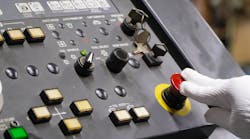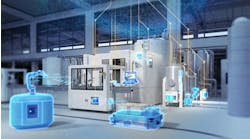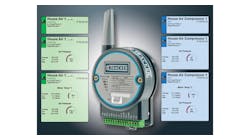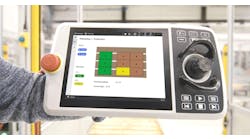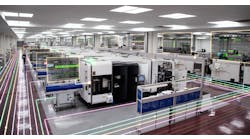The demand for efficiency in modern manufacturing is higher than ever because customers value speed, precision, and cost-effectiveness. To stay competitive, machine shops and larger manufacturers embrace innovative solutions like automation and advanced numerical control (NC) systems, which streamline production, reduce waste, and deliver exceptional accuracy. Focusing on efficiency addresses current pressures and helps companies set themselves up for long-term success in a demanding global market.
Numerical control machining is an automation process that uses programmed and stored commands to direct machine tools to perform precisely defined tasks or functions on command.
The productivity problem
Shops operating by manual machining still must compete according to industry demands. The limitations of manual machining — like susceptibility to human error, time inefficiencies and inconsistent quality — can lead to costly mistakes and missed deadlines. As machining operations push for faster production and greater precision, the shortage of skilled machinists compounds the problem, leaving many unable to meet growing expectations.
At the same time, global competitors pull ahead by embracing automation, and the automotive sector has led the charge. Automakers alone account for about one-third of all industrial robots worldwide, which sets the standard for speed, scalability and precision. For organizations relying solely on manual processes, the pressure to compete in this market is undeniable – and the need to innovate has never been more urgent.
NC automation changes how manufacturers approach productivity by reducing cycle times and increasing throughput. These systems integrate preprogrammed instructions to elevate automation and precise control over cutting operations. This capability is highly beneficial for industries where tight tolerances and process accountability are nonnegotiable, including aerospace, medical/surgical devices, and automotive.
Whether a manufacturer produces complex components or manages high-volume orders, NC automation ensures efficiency and precision manual processes cannot match. Upgrading to numerical control is a perfect step for brands looking to meet demanding quality standards while staying competitive.
Beyond production, NC automation enhances operations through predictive maintenance and smarter scheduling. Automated systems can monitor equipment in real time and identify potential issues before they result in breakdowns. Scheduling optimizations streamlines operations further by ensuring machines are operated at their full potential.
Perhaps most impressive, automation allows manufacturers to adapt production volumes rapidly, scaling up or down without sacrificing quality. Flexibility is crucial in a dynamic market, where customer demands and supply-chain conditions may shift overnight.
Benefits beyond productivity
Automation transforms manufacturing by reducing dependence on skilled machinists and embedding expertise directly into advanced systems. With this tool, tasks requiring years of specialized training can be executed precisely and consistently through programmed processes.
This shift improves overall efficiency and protects against disruptions due to employee turnover. When a skilled machinist leaves, his expertise no longer leaves with him — automation ensures productivity remains stable and gains are baked into the system. Manufacturers can scale operations confidently without worrying about losing critical skills.
In addition to workforce advantages, precision machining minimizes waste to make the most of expensive raw materials and reduces errors that lead to scrap. Modern NC systems are also designed for lower energy consumption to help manufacturers cut operational costs while maintaining peak performance.
This dual benefit of resource optimization and consistent output positions automation as an essential investment for businesses eager to stay competitive. Embracing these technologies can streamline production, reduce environmental footprints, and future-proof operations.
Integration with supply chain, logistics
NC systems integrate seamlessly with supply-chain software to provide live updates on production statuses. This real-time visibility ensures better coordination across the entire supply chain and enables manufacturers to track progress, identify bottlenecks, and adjust schedules.
In addition, NC systems also align perfectly with lean manufacturing practices, helping firms reduce overproduction and cut inventory spending. This means manufacturers can maximize efficiency while freeing up human workers to focus on quality control and problem-solving instead of routine, repetitive tasks.
The role of the IoT and smart machines is to create a fully connected production and logistics network. IoT-enabled systems monitor detailed equipment performance, shifting manufacturers from reactive to predictive maintenance.
It’s estimated this approach can prevent up to 75% of breakdowns, to save time, reduce repair costs, and extend machine life. Combining IoT insights with automation reduces human effort, maintains consistent quality, and improves resource utilization. These advanced systems empower businesses to stay competitive in a complex, fast-paced market.
Overcoming barriers to adoption
While the upfront cost of automation may be daunting, the long-term return on investment often outweighs the initial expense. NC automation delivers faster production, reduced material waste and improved energy efficiency, which translates into significant savings over time.
Additionally, consistent quality and fewer errors mean fewer costly reworks and better customer satisfaction. To maximize these benefits, it’s essential to train machinists and operators to work seamlessly with automated systems and enable them to oversee processes, troubleshoot, and optimize performance.
For machining operations new to automation, starting small can build confidence and create a clear roadmap for scaling up. Businesses looking to adopt this technology at scale must also invest in skills development, organizational restructuring and supporting technologies. Taking a strategic, phased approach can unlock the full potential of automation while minimizing risks and disruption.
Manufacturers looking to boost efficiency and stay competitive should explore NC automation solutions tailored to their needs. Consulting with experts can help identify the right systems and strategies to maximize productivity, improve quality, and achieve long-term success.
Emily Newton is the Editor-in-Chief of Revolutionized, an online magazine exploring the latest industrial innovations.
